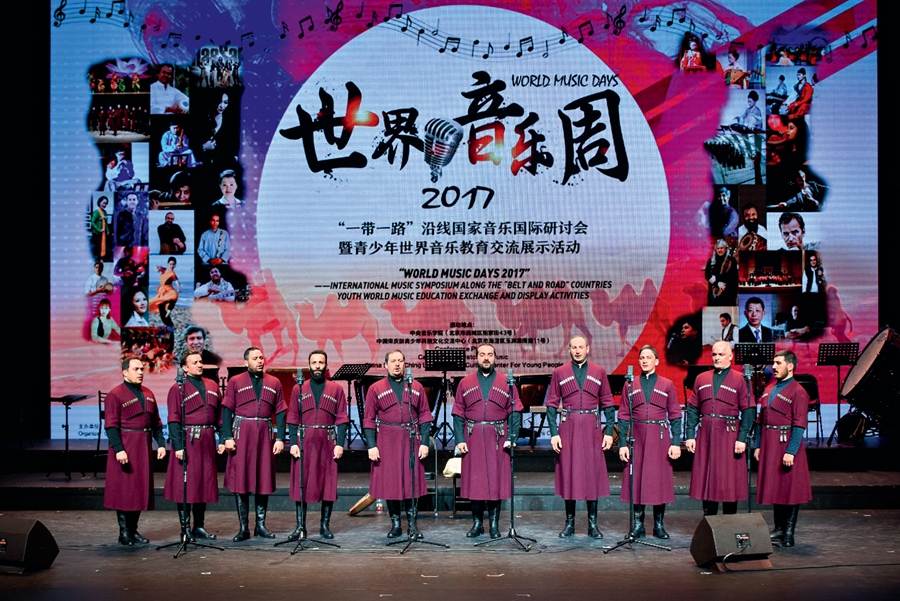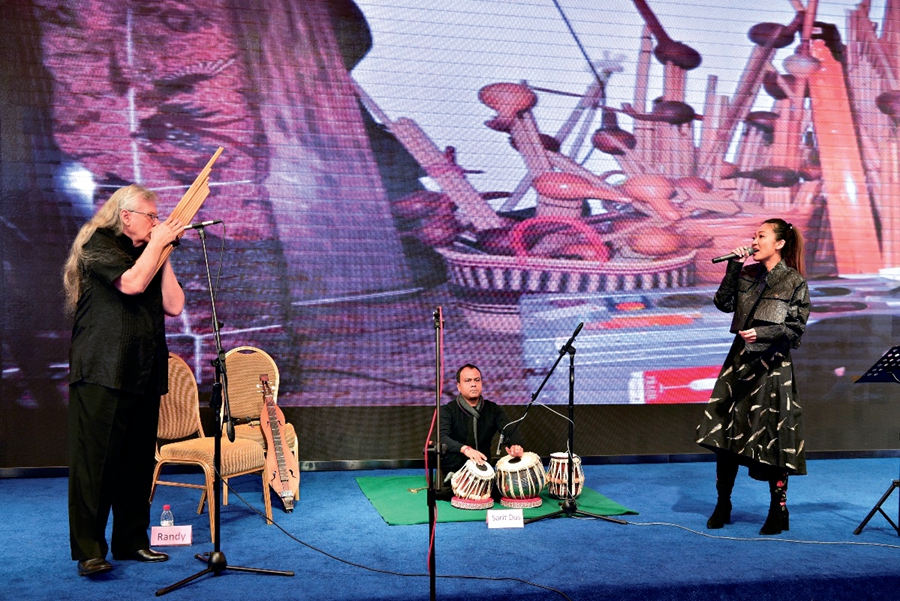By staff reporter ZHOU LIN
AT the main hall on the eighth floor of the Youth Science, Technology, and Culture Exchange Center of China Soong Ching Ling Foundation, musicians and scholars from around the world, enthusiastic children, and their parents converged at the end of 2017 to watch a special performance by a combination of three musicians: a famous tabla artist from India Sarit Das, a Canadian musician Randy Raine-Reusch and a Chinese-Canadian singer Zizi, who perfectly presented the diversity of music with unique instruments and soulful songs.
As a high-level world music cultural exchange and academic event initiated by the Central Conservatory of Music, the World Music Days have convened nine sessions around the world since 2007, organizing activities in over 20 countries across Asia, Africa, Latin America, Europe, and Oceania. Talking about the original intention, the Dean of the Central Conservatory of Music Yu Feng wrote in his welcoming speech for the World Music Days 2017, “To understand ourselves better, we need to know others; to better understand China we need to learn about the world.”
Universal Language
“Music is a universal language. Every musician can empathize with others through their instruments and music, no need to learn Chinese or Hindi,” Sarit Das expressed his own understanding of music and his love of the Indian traditional instrument – tabla. “Guitar and tabla can speak with each other, like two friends who can constantly exchange views and never run out of topics. Through melodies and beats, two players can earn mutual respect of each other.”
In Sarit Das’s eyes, playing the tabla is seeking the meaning of his life. “Every day, lots of people are born or die, and we seldom know their names. Nobody knows who I am but some would like to know my work, my music, and my instrument. That is why I am sitting here. Tabla is my identity, my passion, and my work.”
Musicians from Georgia sing polyphonic folk songs during the World Music Days 2017.
Zizi (D’arcy Han) is a singer and songwriter born in a musical family in Beijing and left for Canada with her divorced mother when she was 14 years old, living there for nearly 20 years since then. She is fond of music and has a special sensitivity for rhythm and musical notes. Her mother is a Chinese zither player and her stepfather is Canadian musician Randy Raine-Reusch, who likes to collect and study on musical instruments around the world.
Zizi once felt lost and went through a hard self-discovery process. She finally found a deep cultural identity in the musical world after a long period of piano-practicing days. She realized that she could truly enjoy the wonderful life of music. Due to her unique experiences of adolescence, Zizi formed her own attitude and perspective towards music and life, and her reflection on both the Eastern and Western cultures, as well as her unique thinking on classical, pop, folk, and world music.
Zizi still remembers how surprised she felt when she first saw hundreds of folk musical instruments from across the world in her stepfather’s basement. “It is amazing. The world is so big and musical culture so colorful. I would like to become a sponge to absorb all kinds of music.”
Explore the World
Randy Raine-Reusch is a famous Canadian musician, instrument collector and composer, who has deeply influenced Zizi. For a long time, he has been focusing on playing musical instruments from around the world and constantly expanding the boundaries of music.
From the nose flute from the Malaysian tropical rain-forests to Japanese Ichigenkin (one-string zither) which can only be played by about 100 people worldwide, from the kithara in the United States to Kouxian (jaw harp) of the ethnic minorities in Southwest China, every instrument in the world produces its own moving melodies, and has rich cultural connotations. Having studied traditional music around the world for 40 years, Randy has collected thousands of traditional instruments and can play hundreds of them.
Randy explained the reason for playing a variety of instruments. “Every musical instrument has its own melody and thousands of years of history. Listening to instruments, we can hear the voices of our ancestors. Each instrument can express the feelings of its own nationalities, which cannot be replaced by others.”
A trio of musicians gives a performance to present the diversity of music with unique instruments and soulful songs.
Taking the Kouxian culture in Southeast Asia as an example, Randy elaborated that Southeast Asia was often regarded as the birth place of Kouxian which was later spread to other places. The tiny instrument is made from metal, bamboo or palm bark, and can be found in Thailand, Indonesia, and the Philippines. In all these cultures, Kouxian is an auxiliary sounding tool, a communication media to help people contact with the deities since humans are forbidden to use their own voices as a respect to the gods in ancient times.
Randy’s constant discovery and innovation have helped him successfully play Asian folk instruments in diverse genres ranging from jazz, rock, and pop music. Musicians from all over the world come to Randy to seek cooperation, producing music in different genres fused with instruments from the world.
Indian musician Sarit Das agreed with Randy’s take on musical instruments, “Tabla is an instrument which cannot speak but the musician’s fingers can play out the melodies to audiences. During the performance in China, tabla offers me a way to communicate with audiences without uttering a word.”
Randy likened music to a large garden, in which the “piano is just one of these splendid flowers. If we have 10,000 flowers in our garden, it would be fabulous!”
Cultural Identity
During the World Music Days 2017, Eastern and Western musicians and scholars from the Belt and Road countries got together to give lectures, workshops, and concerts. All participants used their instruments and songs to have a heart-to-heart communication with the audiences and made children feel the charms of world music.
This is the first time for the World Music Days to focus on teenagers and children, inviting them to participate in music exchanges and learning. Children cannot help expressing their love for these lively classes from which they can hear different music and have a personal experience of musical knowledge in textbooks.
Professor An Ping of the Central Conservatory of Music, the art director of “World Music Days 2017,” told China Today, “Music education is an art education for children to feel sincerity, kindness, and beauty, as well as the bright side of life. This is the first time that we add the element of musical culture exchanges for teenagers and incorporate interactive activities. Inviting these musicians to share their own stories and allowing children to be immersed in different cultures to know about musicians’ cultural identities and their dreams. Chinese youngsters can feel that music has a communication power, and thus bridge the way for them to link with the future world.”

